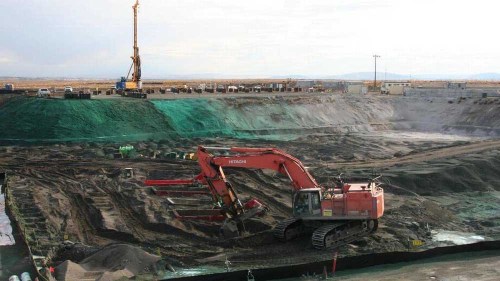State wants Biden to overturn Trump rule on Hanford nuclear waste
Published 11:45 am Monday, March 1, 2021

- Washington Closure workers are cleaning up a hazardous seven-acre site called the 618-10 Burial Ground, processing highly contaminated drums and containers.
RICHLAND, Wash. — The state of Washington and other groups are asking the Biden administration to overturn a Trump administration rule that would allow the federal government to potentially clean up the Hanford nuclear reservation to less stringent standards.
A letter sent on Friday, Feb. 26, to Jennifer Granholm, just a day after she was confirmed as energy secretary, was signed by leaders of Washington state, the Yakama Nation, the Natural Resources Defense Council, Hanford Challenge and Columbia Riverkeeper.
Trending
They call the Department of Energy’s decision in 2019 to allow the reclassification of some Hanford site and other radioactive waste “a matter of extraordinary concern.”
The new DOE rule, which was adopted to relax the interpretation of what is defined as high-level radioactive waste, “lays the groundwork for the Department to abandon significant amounts of radioactive waste in Washington state precipitously close to the Columbia River,” the letter said.
It would create a long-term risk of harm to the residents of the Pacific Northwest and the natural resources critical to the region, it said. However, some Tri-Cities area interests have supported the revised interpretation of high-level radioactive waste, saying it could save billions of dollars in environmental cleanup money across the nation, making more money available for some of the most pressing environmental cleanup at the Hanford nuclear reservation. The Hanford Lifecycle report issued in 2019 estimated would require $323 billion to $677 billion to complete, say those who support the new interpretation.
Energy Communities Alliance — a nationwide coalition of local governments near DOE sites, including Hanford Communities — says the clarification to the definition of high-level waste could save the nation as much as $40 billion while still being protective of the environment.
DOE told Congress that reclassifying waste could save up to $210 billion at Hanford. Taxpayers have been spending about $2.5 billion annually for Hanford environmental cleanup.
Under U.S. law, any waste produced when fuel irradiated at Hanford reactors was chemically processed to remove plutonium is classified as high-level radioactive waste. But internationally, waste classification is based not on how waste is produced, as it is for high-level waste in the United States, but on its radiological risk.
Trending
The 56 million gallons of radioactive waste stored in underground tanks at Hanford is by definition high-level waste, created when irradiated uranium was processed to remove plutonium for the nation’s nuclear weapons program.
But 90% of it is referred to as low activity radioactive waste and managed as it if is low-level rather than high-level waste by agreement between the state of Washington and the federal government.
DOE’s new policy allows the agency to reclassify radioactive waste if it determines it does not exceed certain radionuclide concentrations for low-level waste or does not need to be disposed of in a deep geological repository, such as the one proposed at Yucca Mountain, Nevada.
Previously, high-level waste could be reclassified, but under a more involved process that relies on the Nuclear Regulatory Commission.
‘Trump-era rule has to go’
Hanford watchdogs have said that giving DOE authority to reclassify high-level waste could lead to grouting waste inside Hanford’s underground tanks, rather than retrieving the waste and properly treating it for disposal.
DOE began building the $17 billion vitrification plant in 2002 to turn some, but not all, of the tank waste into a stable glass form for disposal. Turning some of the excess waste into a concrete-like grout for disposal rather than glassifying it has been proposed.
The Washington state Department of Ecology has maintained that any treatment of tank waste must produce a waste form that is “as good as glass” to protect the environment and prevent contaminants from leaching into the soil and reaching groundwater.
Those who signed the Friday letter agree that “trying to change Hanford’s high-level tank waste to low-level waste through the stroke of a pen is no solution, and this Trump-era rule has to go,” said Tom Carpenter, executive director of Seattle-based Hanford Challenge, which advocates for Hanford workers.
The new interpretation of high-level waste gives DOE unilateral authority to redefine high-level radioactive waste with no opportunity for input, oversight or consent by state regulators or the public, the letter said.
“And it fails to hold the Department and the federal government accountable for adequately cleaning up the legacy waste that is left over from the establishment of the United States’ nuclear arsenal,” the letter said.
The new interpretation of the definition of nuclear waste conflicts with a Biden administration order that agencies should follow science, improve public health and protect the environment, the letter said.
Those signing the letter on behalf of Washington state include Attorney General Bob Ferguson and the director of the Department of Ecology, Laura Watson.









